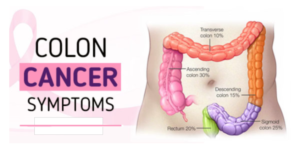Colon cancer is the most common type of gastrointestinal cancer. It is caused by genetic factors, environmental exposure (including diet), and inflammatory condition of the digestive tract. The Big C! Yes, the name cancer is enough to send a chill down the spine. We are all scared of the consequences and the treatment, but cancer can be put into remission if it is caught in the early stages.
So, how do we catch it early before it catches us unawares? The easiest way of doing this is by being more aware of colon cancer symptoms. But first, let us delve deep and find out what colon cancer exactly is.
What Causes Colon Cancer?
While it is impossible to put a finger on one single cause of colon cancer, there are certain factors that can be attributed to the risk of developing the disease.
These factors are genetics, health, and diet. Individuals who have had a family history of colon cancer, especially people who have more than one relative affected by the disease, are at increased risk.
Also, two genetic syndromes, the lynch syndrome and familial adenomatous polyposis; have been linked with colon cancer. A diet high in fat and red meat, can double your risk of developing the disease. It has been found that colon cancer is rare in places where red meat is not an integral part of the diet.
Apart from diet, heavy drinking coupled with smoking, may increase the chances of colon cancer.
Symptoms of Colon Cancer
Catch the symptoms early, to give yourself a better chance of living a quality life even when you are diagnosed with colon cancer. Signs and symptoms of colon cancer include:
- A sudden change in your bowel movements, which includes diarrhea or constipation, change in the consistency of the stool. If the symptoms last longer than four weeks, then it deserves that walk to the doctor’s chamber.
- Blood in your stool or rectal bleeding.
- A feeling that you haven’t been able to empty your bowel completely.
- Unremitting abdominal discomforts, such as flatulence, cramps or pain.
- A feeling of weakness or fatigue.
- Unexplained and sudden weight loss.
- Many people with colon cancer probably will experience no symptoms in the initial stages of the disease. When symptoms are more pronounced, they are likely to vary; it depends on how far your cancer has spread and the location of the cancer in your large intestine.
Denocarcinomas constitute about 95 percent of all colon cancer cases. They develop in the gastrointestinal tract, especially in the cells of the lining of the colon and/or the rectum.
They usually start as a growth of tissue known as a polyp. A particular type of polyp known as an adenoma may proliferate into cancer. Polyps are thus removed during the time of a routine colonoscopy before they finally grow into cancer.
Some of these polyps may develop into colon cancers over a period of time if they are not taken out during colonoscopy. Colonoscopy is a procedure which looks at the inner lining of the intestine.
Colon cancer cells invade and destroy the healthy tissue close to the tumor, giving rise to complications.
How to treat:
In Ayurveda and Naturopathy we can treat colon cancers easily in early stage. We prevent the colon cancer in various methods through Ayurveda and Naturopathy, Prevention is better than cure. If you experience any symptoms immediately consult an Ayurveda doctor.

